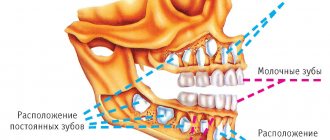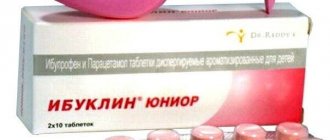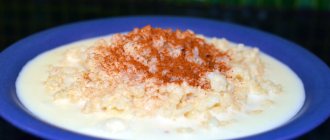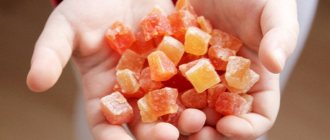Recommended age for candy
The concept of “sweets” includes candies, chocolates, caramels. It is not recommended to give sweets to children under one year of age, since the baby’s immune and digestive systems have not yet established their functioning. Sugar can cause fermentation in the intestines, and hence problems with stool and rashes.
Children prone to diathesis do not need sweet foods until they are 2 years old. Their introduction is possible, but later and with caution.
A child up to one year old can be given sweets in the form of natural sugars. These are fruits and lactose from mother's milk. Water and kefir should not be sweetened.
At what age can you give your child sweets? At what age can you give your child sweets?
Time passes, the baby grows up, and parents begin to think: at what age can you give your child sweets? Any pediatrician will answer that the later the baby is introduced to artificial sweets, the better for his health. In fact, the baby doesn’t even know about the existence of all sorts of chuppies - chups, lollipops and sweets. Therefore, you should not introduce them into his diet until at least a year, and better yet, up to three years.
What tasty treats can you treat your little ones to then? What sweets can a 1 year old child eat? Offer your baby fruits and berries rich in natural sugars. And while your baby’s taste perception is not spoiled, do not stuff him with too sweet, salty or spicy foods. Simple soups and porridges, natural vegetable and fruit purees are still tasty for him. And rest assured, the time will come when the baby will ask you for sweets himself, having learned what it is.
At this moment, it is important to offer the baby exactly those sweets that are good for children. You might be surprised, but it turns out that sweets can also be healthy. And what’s more, you can prepare these healthiest sweets for your child at home from high-quality and fresh ingredients. Then you can pamper your beloved child with a sweet surprise, such as homemade marshmallows, marshmallows or dried fruit candies.
Harmful products
It is not recommended to use:
- pure sugar. It is better not to add sugar to cereals and purees. It distorts the taste of food, and the child quickly gets used to it;
- Caramel is the worst type of sweet for baby's teeth. Also contains many dyes, sugar;
- pastries and cakes contain a large amount of fats and carbohydrates. This creates a huge load on the small pancreas, but there is no benefit;
- preserves and jams are also high in sucrose.
Dried apricots, dates, raisins are not only foods rich in magnesium and potassium, but also have a pleasant sweetish taste.
They can also act as a dessert for the baby. Excessive sugar consumption up to a year can provoke:
- the occurrence of arterial hypertension in older age;
- the occurrence of obesity, metabolic syndrome, diabetes;
- other endocrine disorders.
Psychologists say that early accustoming a baby to sweets is akin to addiction. A study was conducted, and children who often received chocolate in childhood cannot resist eating sweet foods when they are older.
Sweets: good or bad
The concept “sweet” includes a large list of products containing large quantities of fructose and sucrose. These are confectionery products, candies, baked goods, ice cream, jelly, marmalade, marshmallows, marshmallows, etc. Sugar-containing foods are indispensable for the body. They are a source of energy and are necessary for normal brain activity.
In addition to fructose and sucrose, many treats contain useful substances necessary for the body. Dried fruits, marshmallows and marmalade contain easily digestible carbohydrates and microelements. However, do not buy marshmallows or marmalade in bright colors. Such products contain a lot of dyes that can harm the body.
Honey in general is a storehouse of useful substances: microelements, vitamins, enzymes and other biologically active compounds. It has high antiseptic and antibacterial properties. At the same time, immunity is increased and the internal forces of the body are accumulated. You should be careful when introducing honey into your diet - it is a pronounced allergen.
In addition to the benefits for the body, sweets are a powerful source of positive emotions. A child enjoys a beautiful cake at a birthday party or while walking, eating nuts with his mother.
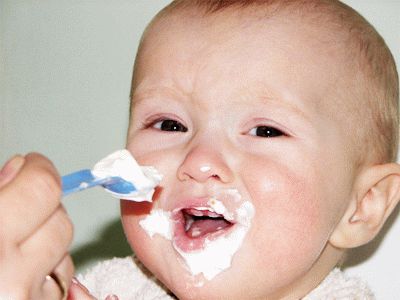
But it is better to avoid using some sweets altogether:
- Sugar in its pure form does not bring any benefit. You should not add it to porridge, tea or purees for your baby. Adults just think that it will taste better for a child. He gets used to bland food and its taste suits him.
- Cookies, cakes and pies are high in fat, heavy carbohydrates and sugar. They quickly saturate the small body, but do not bring any benefit. It is worth giving up the daily use of these products, leaving them exclusively for the holiday menu.
- Jams, preserves and preserves are a concentrated solution of sucrose in fruit juice or puree. The benefits of these products are questionable, and the high sugar content is alarming. You can spread a thin layer on the sandwich, but don’t get carried away.
- Candy can be given to a child only after three years. The most harmful of these treats are caramels and candies. They contain a lot of sugar and dyes and will not bring any benefit. If you really want to give candy to a child, then let it be chocolate. Chocolate contains B vitamins and antioxidants that strengthen the immune system.
When can babies be given their first treats?
So, some sweets can be given to kids. They will bring positive emotions and benefits to the growing body. The question arises: when can children be given sweets, when is the time to give them the first treat?
The first sweets and small amounts of sugar can be introduced into the diet after the first birthday.
It is better to start your journey through the world of sweet pleasures with fruit mousses, prepared with your own hands from fresh berries and fruits. Then you can let your baby try marshmallows, marmalade and jelly candies. After the third birthday, it’s time to try low-fat ice cream and cakes with light cream.
Give sweets only after the main meal. This way, he won't crave a lot of sweets and won't lose his appetite if you give him a treat between feedings.
can children have sweets?
In principle, children, like all people, can easily do without treats. From birth, the baby knows and loves one type of “sweetness” - lactose in breast milk. And only parents with their own habits sweeten tea, porridge and other foods for their child. Over time, the child gets used to the taste of sweets and may even refuse regular food. In addition, excess carbohydrate foods can lead to metabolic diseases (for example, diabetes mellitus, nutritional obesity) and caries on baby teeth.
Children with a sweet tooth most often grow up with parents with a sweet tooth, since it is adults who form the food stereotype in their children. Parents themselves, consuming a lot of sweets, believe that their kids need it too. The second reason for the occurrence of children with a sweet tooth is the lack of attention given to the child. Having tried a treat for the first time, the baby, not receiving enough attention and affection in the family, wants to receive it with pleasure from the treat.
You should not offer your baby sweets from an early age, but when starting to pamper him, you should do this wisely. Do not replace your love and affection with sweets, do not give them as encouragement. Instead of giving your child candy once again, it is better to go with him on a fun walk, arrange a mischievous game, or go to the circus, and replace sweets with fruits and nuts.
READ MORE:
- Child and sweets: building the right relationship
- First feeding: the beginning
- First juices
Childhood is a wonderful and carefree period of life. The baby's mandatory introduction to sweets will certainly come. And many mothers are categorically against children under 3 years old eating chocolate or candy. It’s in vain, sweets are not only joy and a smile, but also energy as glucose to fuel brain neurons. But everything should be in moderation.
Let's figure out together at what age you can give your child candy and how to do it correctly.
The benefits and harms of honey for babies
Honey is a very strong allergen. It is better for children with severe allergies to refrain from using it.
Honey is a storehouse of vitamins and microelements important for the growth and development of a child. Has antiseptic and antibacterial properties. Honey can also increase the immune-resistant properties of a child’s body.
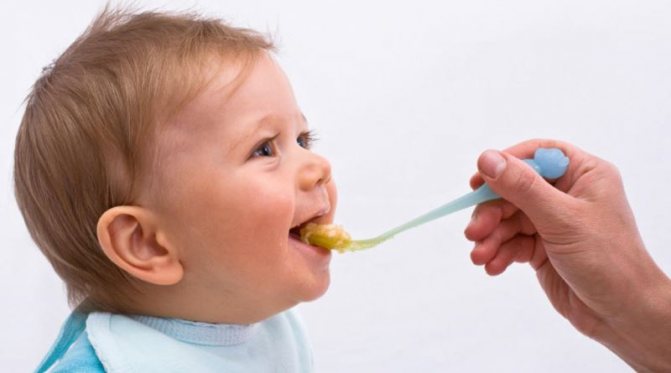
Previously, grandmothers advised mothers to give a spoonful of honey on the tip to calm the baby. It contains sugars that have an energetic effect on cells, improve interneuron connections, and are a source of positive emotions.
When and how to start giving the first sweets?
As we have already found out, children under one year old do not need sweets in any form. You can start after a year with marshmallows or marshmallows, marmalade without sugar powder. It is better to give after the main course, preferably at lunch. If allergic reactions occur, the product is excluded.
After 3 years, your child can start giving sweets in the form of cakes or pastries. At this point, the digestive system is almost completely organized and can process these foods.
To avoid food poisoning, pay attention to the expiration dates of sweet products with protein creams.
Parents themselves shape the eating habits of their children. Excessive consumption of sweet foods may pose a risk of developing metabolic disorders, which will subsequently lead to obesity, diabetes and other endocrine diseases.
Try not to reward your child with candy. It’s better to praise him or hug him once again. Do not develop a food addiction to sweets in your baby.
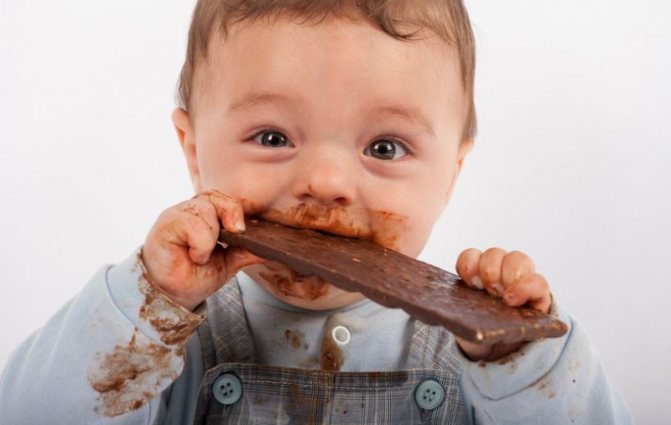
Teeth and sweets
Artemova I. O., doctor, pediatric dentist: “Of course, childhood without sweets is not childhood.
Try to brush your baby teeth or rinse your mouth after eating sweets. This way you can avoid caries in baby teeth.” Sweets for children according to Komarovsky : “This is not the best food for children. It is especially harmful to teeth and appetite. Of course, you won’t do much harm to your health if you give sweets for dessert after dinner, but it’s best to avoid such treats between feedings. Do not keep sweets at home, do not show your child that they are in the house. Try not to go shopping with your child or buy sweets in front of him. If a child has a tendency to be overweight, then it is better to give up sweets altogether.”
It is very easy to teach a child to eat sweets, as it brings him pleasure. Try to give sweets for dessert at least 1-2 times a week, respecting the age limits. If you are prone to allergic reactions, sweets should be completely excluded from the diet.
When can you give sweets?
Don't think that you are depriving your child of something important. He won't lose anything.
If you adhere to the right beliefs and act wisely, you will not only be able to avoid teaching your baby to eat sweets, but you will also forget about this bad habit.
- At what age can children have sweets?
There is no specific criterion, follow the rule: the later and the smaller, the better. After all, habits are formed from childhood.
If you don’t teach it at a young age, there will be no dependence at an older age. If there is an opportunity not to show sweets to children and not to eat in front of them, let them not know. Before 1.5-2 years old, you should not introduce your child to sweets and white sugar.
- What to do when older children already eat sweets;
- In this case, it is already more difficult to hide sweets from the baby. Adjust the diet of the whole family - give something that contains little sugar - dry foods, long-lasting cookies. Perhaps the older one will also like it;
- Or even make “natural sweets” yourself, as many adherents of proper nutrition are now doing to pamper their children without harming their health.
- If you still decide to feed your child sweets after 12 months, what sweets can a child have per year? Better, none



